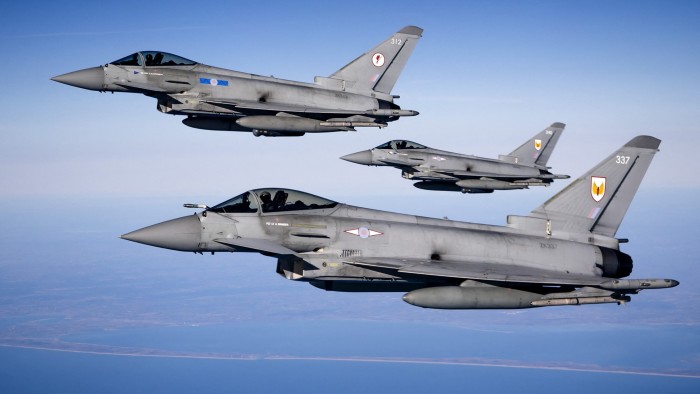Unlock the Editor’s Digest for free
Roula Khalaf, Editor of the FT, selects her favourite stories in this weekly newsletter.
Donald Trump has been warning Europe to spend more on defence for years. Late last month, he got his wish.
Nato’s 32 members — of whom 30 are in Europe — pledged to spend five per cent of their GDP on defence, and provide “annual plans showing a credible, incremental path” to doing so.
For most countries, that 5 per cent will be a hefty jump. Granted, some nations closer to Nato’s eastern flank are a little closer to that mark, like Poland (an estimated 4.1 per cent in 2024), Estonia (3.4 per cent) and Latvia (3.15 per cent). But the UK, Germany, France, and other large players are some way off.
So how will European countries, beset by high debt, growing deficits and stagnant economies, actually pay to protect themselves?
Sam Fleming, MainFT’s economics editor, spoke to Jeromin Zettelmeyer to find out. Zettelmeyer is the director of the Brussels-based economic think-tank, Bruegel. He’s also held senior roles at the IMF, the Peterson Institute, and in the Germany Ministry for Economic Affairs and Energy; he’s pretty close to these issues.
As Zettelmeyer points out in the interview (which you can listen to here; no paywall), the future of European defence is likely to be collective. That’s going to throw up all kinds of economic and political realignments. Higher taxes and lower civilian spending are likely. But there are several major unknowns:
A single market for defence?
Zettelmeyer predicts the creation of a “single market for defence” to solve a mismatch between supply and demand for materiel in Europe. European countries currently operate a patchwork of tanks, aircraft and other instruments of war, largely supplied by national champion companies with near-monopolies in their home markets. A lack of competition, combined with small order sizes, makes procurement expensive. Creating a single market — and aggregating demand — would bring down the cost of buying essential hardware.
Will the big players go for it?
Appetite for joining a single market, Zettelmeyer says, differs from country to country. Doing so would be a boon to the UK, which could sell into a huge pool of demand without being part of the EU. Smaller producers would also benefit from that demand. But two key players — France and Germany — could potentially stand to lose from greater competition, with more money flowing to producers in other countries. Can they be convinced?
How can debt-ridden countries fund this?
There are all manner of proposals for funding European defence purchases — Zettelmeyer discusses a few — but the most interesting involves collectively issued EU debt. There’s plenty of demand for such debt, and issuing it jointly would allow countries under budgetary pressure to keep a lot of red ink off their books. That would be welcome relief for a few countries. But would it be fair?
The full interview between Sam and Zettelmeyer is available here, as is the transcript. Your thoughts are welcome in the FTAV comment box.
#Europes #single #market #defence #Jeromin #Zettelmeyer


